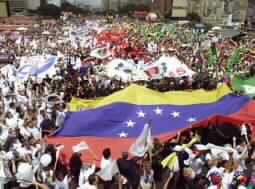HIGHLIGHTS: Country Plagued by Lingering Uncertainty Since April Coup||Security Measures Taken to Protect President||Chavez Leaves Caracas to Visit Pro-government Rallies West & Southwest of the Capital|| STORY: Tens of thousands of demonstrators marched through Caracas on Saturday urging President Hugo Chavez to resign as his government tried to quell rumors of an impending military uprising two months after a coup briefly toppled the left-wing leader. (Read photo caption)
Eight weeks after the April 11-14 coup against Chavez, Venezuela is plagued by lingering political uncertainty as fears of a fresh rebellion have rattled the world's fifth largest oil exporter.
Interior Minister Diosdado Cabello told Reuters the country remained calm despite worries over a potential coup. But the minister said the government had taken extra security measures due to a "thesis" about a possible attack on the president.
"Rumors should be treated as nothing more than that as they generate unease," Cabello said. "The government has taken some precautions because we are obliged to be on guard."
Chavez, a former paratrooper who himself lead a failed coup in 1992, reportedly left presidential palace in Caracas to visit pro-government rallies in Aragua and Tachira states to the west and southwest of the capital.
Speaking to the anti-government rally soaked by a sudden rainstorm, opposition party leaders said they planned more civil disobedience protests and would march next month to the Presidential Palace, where gunman opened fire on a similar anti-government rally hours before the April coup.
CHAVEZ PROFILE
A populist who says his self-proclaimed "revolution" helps the poor, Chavez counts on the nation's gritty slums and working-class neighborhoods for his political backing while opposition leaders hold rallies in the capital's wealthy eastern suburbs.
Emotions are running high on both sides of Venezuela's political divide as talks between the rival groups have stalled amid sniping over who is to blame for deaths during the coup and its causes.
Elected by a landslide in 1998, Chavez has seen his popularity eroded as business and union leaders and even military officers blamed his statist economic policies and close ties to anti-U.S. states for driving off investors and dividing the nation.
Opposition leaders are now pushing for constitutional reform to remove the president from power, including amending the constitution to shorten his term in office and calling a referendum that could prompt fresh elections.
PHOTO CAPTION
Venezuelans stage a large protest march against the government of President Hugo Chavez through downtown Caracas, June 15, 2002. Thousands took to the streets to demand Chavez resign. (Jose Miguel Gomez/Reuters)
- Author:
& News Agencies - Section:
WORLD HEADLINES


 Home
Home Discover Islam
Discover Islam Quran Recitations
Quran Recitations Lectures
Lectures
 Fatwa
Fatwa Articles
Articles Fiqh
Fiqh E-Books
E-Books Boys & Girls
Boys & Girls  Ramadan
Ramadan Fatwa Audios
Fatwa Audios Month of Mercy
Month of Mercy Women
Women Eed Al- Fitr
Eed Al- Fitr Food Recipes
Food Recipes Videos
Videos

 Prayer Times
Prayer Times












